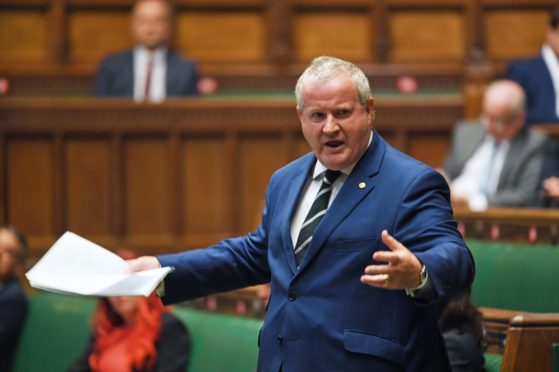Boris Johnson has been blasted for past comments suggesting the Scottish Parliament is an “unjust” institution that drains England’s coffers.
The prime minister, while working for the Telegraph as a journalist, wrote that devolution was “causing all the strains that its opponents predicted”, before adding “allowing the Scots to make their own laws, while free-riding on English taxpayers – is simply unjust”.
The remarks, made in a 2001 column, resurfaced at prime minister’s questions this afternoon, with the SNP demanding to know whether Mr Johnson still held that view.
SNP Westminster leader Ian Blackford said: “Let me ask the prime minister two specific questions that need two specific answers – firstly, does he still think that devolution in Scotland is unjust?
“And secondly, where does he believe full spending and decision-making powers over our NHS, education, infrastructure, economic development, culture and sport, should be held? With Scotland’s parliament or with Westminster?”
Mr Johnson did not address the column directly, but said: “Obviously there is a very considerable, and there has been, a massive devolution of powers to Scotland and the Scottish people had the opportunity to vote for more in 2014, as he will recall in a once-in-a-generation event, and they chose decisively to reject that I recall and I think that he said it was a once-in-a-generation event as well.
“They now have the opportunity to vote to support the further devolution of powers in the UK Internal Market Bill and I hope that he will join us in the lobbies in support of that.”
Mr Blackford dismissed the response as “nonsense” and suggested the prime minister’s legacy would be leading the UK to breaking international law as well as breaking the “failing union”.
The PM responds by highlighting the opportunities to boost Scotland in the internal market bill, Blackford says ‘what nonsense’…he quotes the bill and again brands it a power grab
— Dan O'Donoghue (@MrDanDonoghue) September 16, 2020
He said: “As usual, the prime minister is all over the place. He doesn’t remember what he’s written. He doesn’t understand his own Brexit deal and he doesn’t even know what’s in the Internal Market Bill.
“I’ll tell him – Clause 46 of this Bill allows this Tory Government to bypass Scotland’s parliament and take decisions on the NHS, on education, on infrastructure, on economic development, culture and sport – a blatant power grab.
“We all know what the Tory backbenchers are saying behind closed doors – the prime minister’s incompetent, he can’t govern and they want him away before the next election.”
Mr Johnson responded: “I’m not quite sure from that question whether he is in favour of the union or not. I take it from his hostility to me that he wants to support the union, so do I and the best thing he can do is to support the UK Internal Market Bill which buttresses, as he knows, a surge of powers transferred to the devolved administrations in more than 70 areas.”
The Internal Market Bill sets the legal framework that will govern Britain’s internal market following Brexit.
Concerns have been raised by the Scottish Government that the Bill gives Westminster the power to spend and thus “interfere” in devolved areas, something the UK Government deny.
